Complex Project Management: Experiential Learning Discussion
VerifiedAdded on 2023/06/05
|7
|1223
|320
Report
AI Summary
This report delves into the concept of experiential learning within the context of complex project management, drawing heavily from Terry Cooke-Davies' chapter in 'Aspects of Complexity'. The report examines the benefits of experiential learning, particularly for project managers, emphasizing the importance of reflection and interpretation of experiences. It discusses concerns about experiential learning and the development of meta-competencies, and also references the work of John Dewey. The report highlights that not all experiences lead to beneficial learning and that the ability of the learner to interpret situations is a crucial factor. It explores the factors that influence beneficial learning, and concludes with the idea that a combination of experiential learning and education is essential for the development of a successful project manager.
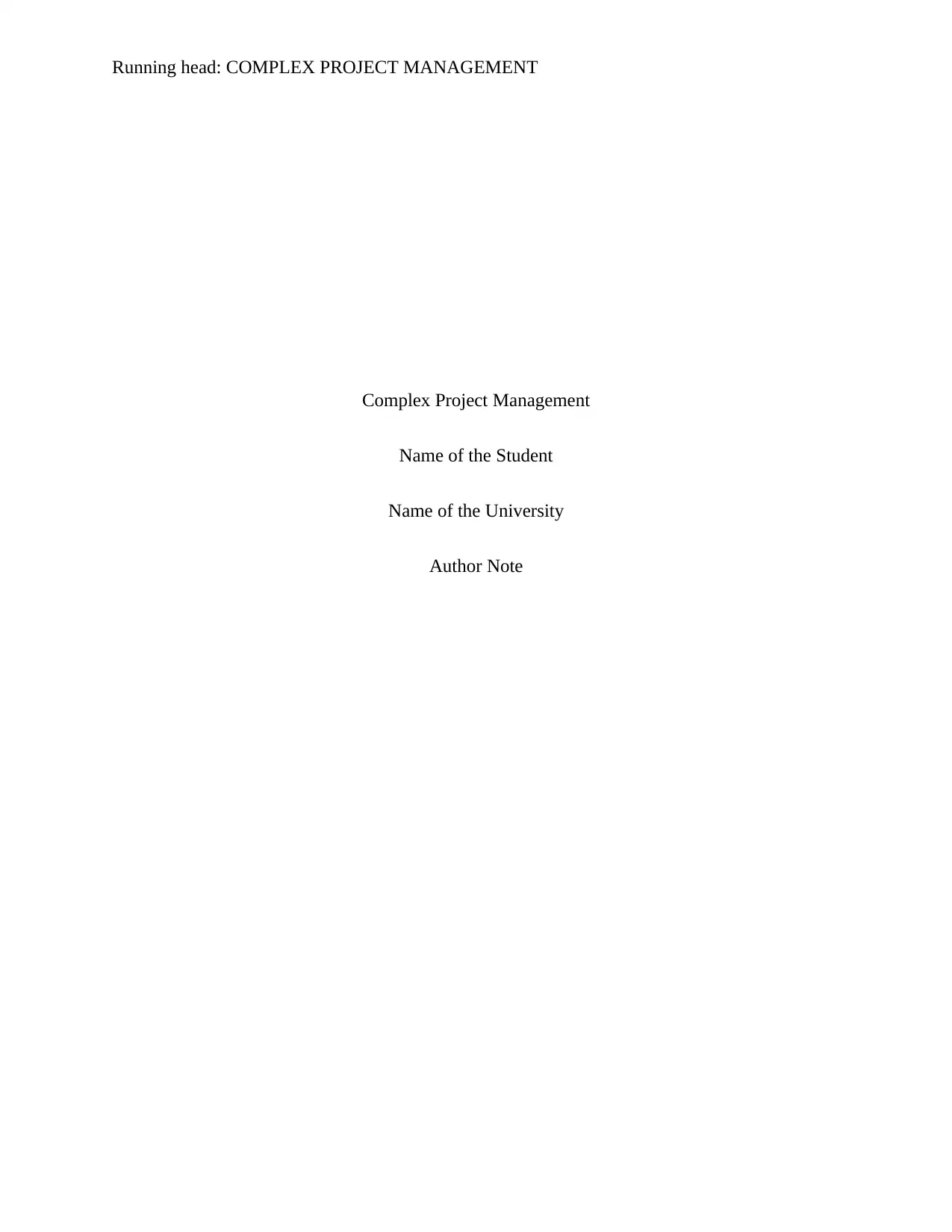
Running head: COMPLEX PROJECT MANAGEMENT
Complex Project Management
Name of the Student
Name of the University
Author Note
Complex Project Management
Name of the Student
Name of the University
Author Note
Paraphrase This Document
Need a fresh take? Get an instant paraphrase of this document with our AI Paraphraser
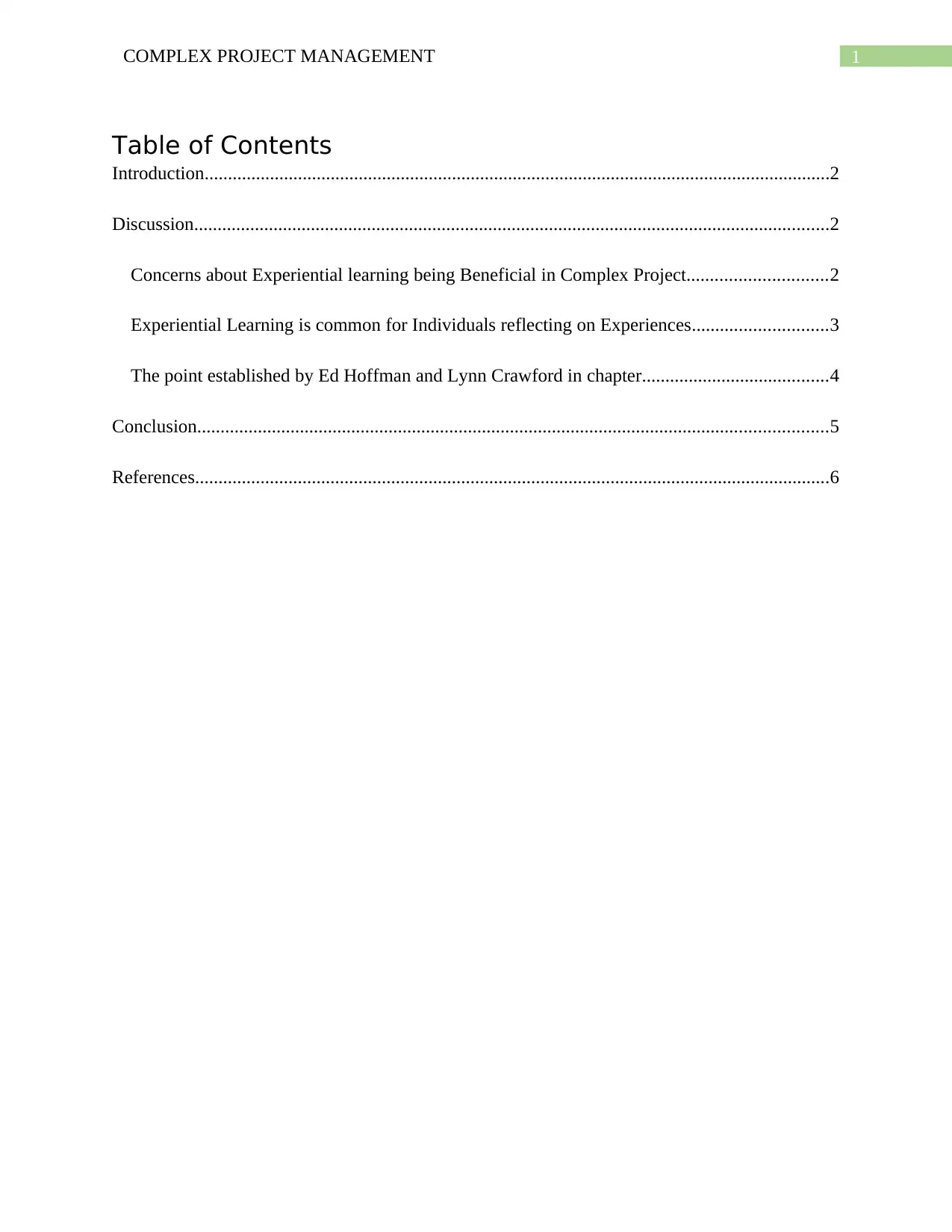
1COMPLEX PROJECT MANAGEMENT
Table of Contents
Introduction......................................................................................................................................2
Discussion........................................................................................................................................2
Concerns about Experiential learning being Beneficial in Complex Project..............................2
Experiential Learning is common for Individuals reflecting on Experiences.............................3
The point established by Ed Hoffman and Lynn Crawford in chapter........................................4
Conclusion.......................................................................................................................................5
References........................................................................................................................................6
Table of Contents
Introduction......................................................................................................................................2
Discussion........................................................................................................................................2
Concerns about Experiential learning being Beneficial in Complex Project..............................2
Experiential Learning is common for Individuals reflecting on Experiences.............................3
The point established by Ed Hoffman and Lynn Crawford in chapter........................................4
Conclusion.......................................................................................................................................5
References........................................................................................................................................6
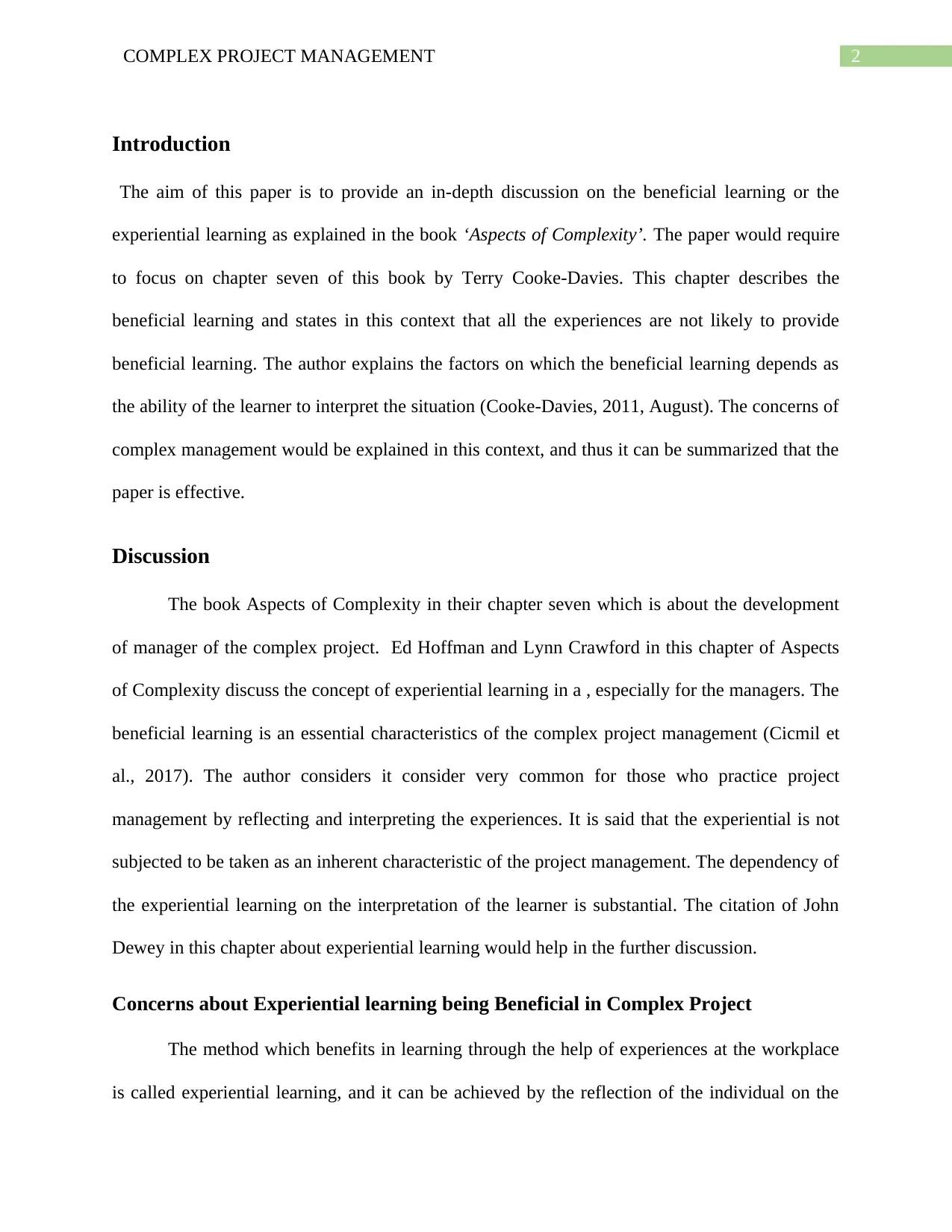
2COMPLEX PROJECT MANAGEMENT
Introduction
The aim of this paper is to provide an in-depth discussion on the beneficial learning or the
experiential learning as explained in the book ‘Aspects of Complexity’. The paper would require
to focus on chapter seven of this book by Terry Cooke-Davies. This chapter describes the
beneficial learning and states in this context that all the experiences are not likely to provide
beneficial learning. The author explains the factors on which the beneficial learning depends as
the ability of the learner to interpret the situation (Cooke-Davies, 2011, August). The concerns of
complex management would be explained in this context, and thus it can be summarized that the
paper is effective.
Discussion
The book Aspects of Complexity in their chapter seven which is about the development
of manager of the complex project. Ed Hoffman and Lynn Crawford in this chapter of Aspects
of Complexity discuss the concept of experiential learning in a , especially for the managers. The
beneficial learning is an essential characteristics of the complex project management (Cicmil et
al., 2017). The author considers it consider very common for those who practice project
management by reflecting and interpreting the experiences. It is said that the experiential is not
subjected to be taken as an inherent characteristic of the project management. The dependency of
the experiential learning on the interpretation of the learner is substantial. The citation of John
Dewey in this chapter about experiential learning would help in the further discussion.
Concerns about Experiential learning being Beneficial in Complex Project
The method which benefits in learning through the help of experiences at the workplace
is called experiential learning, and it can be achieved by the reflection of the individual on the
Introduction
The aim of this paper is to provide an in-depth discussion on the beneficial learning or the
experiential learning as explained in the book ‘Aspects of Complexity’. The paper would require
to focus on chapter seven of this book by Terry Cooke-Davies. This chapter describes the
beneficial learning and states in this context that all the experiences are not likely to provide
beneficial learning. The author explains the factors on which the beneficial learning depends as
the ability of the learner to interpret the situation (Cooke-Davies, 2011, August). The concerns of
complex management would be explained in this context, and thus it can be summarized that the
paper is effective.
Discussion
The book Aspects of Complexity in their chapter seven which is about the development
of manager of the complex project. Ed Hoffman and Lynn Crawford in this chapter of Aspects
of Complexity discuss the concept of experiential learning in a , especially for the managers. The
beneficial learning is an essential characteristics of the complex project management (Cicmil et
al., 2017). The author considers it consider very common for those who practice project
management by reflecting and interpreting the experiences. It is said that the experiential is not
subjected to be taken as an inherent characteristic of the project management. The dependency of
the experiential learning on the interpretation of the learner is substantial. The citation of John
Dewey in this chapter about experiential learning would help in the further discussion.
Concerns about Experiential learning being Beneficial in Complex Project
The method which benefits in learning through the help of experiences at the workplace
is called experiential learning, and it can be achieved by the reflection of the individual on the
⊘ This is a preview!⊘
Do you want full access?
Subscribe today to unlock all pages.

Trusted by 1+ million students worldwide
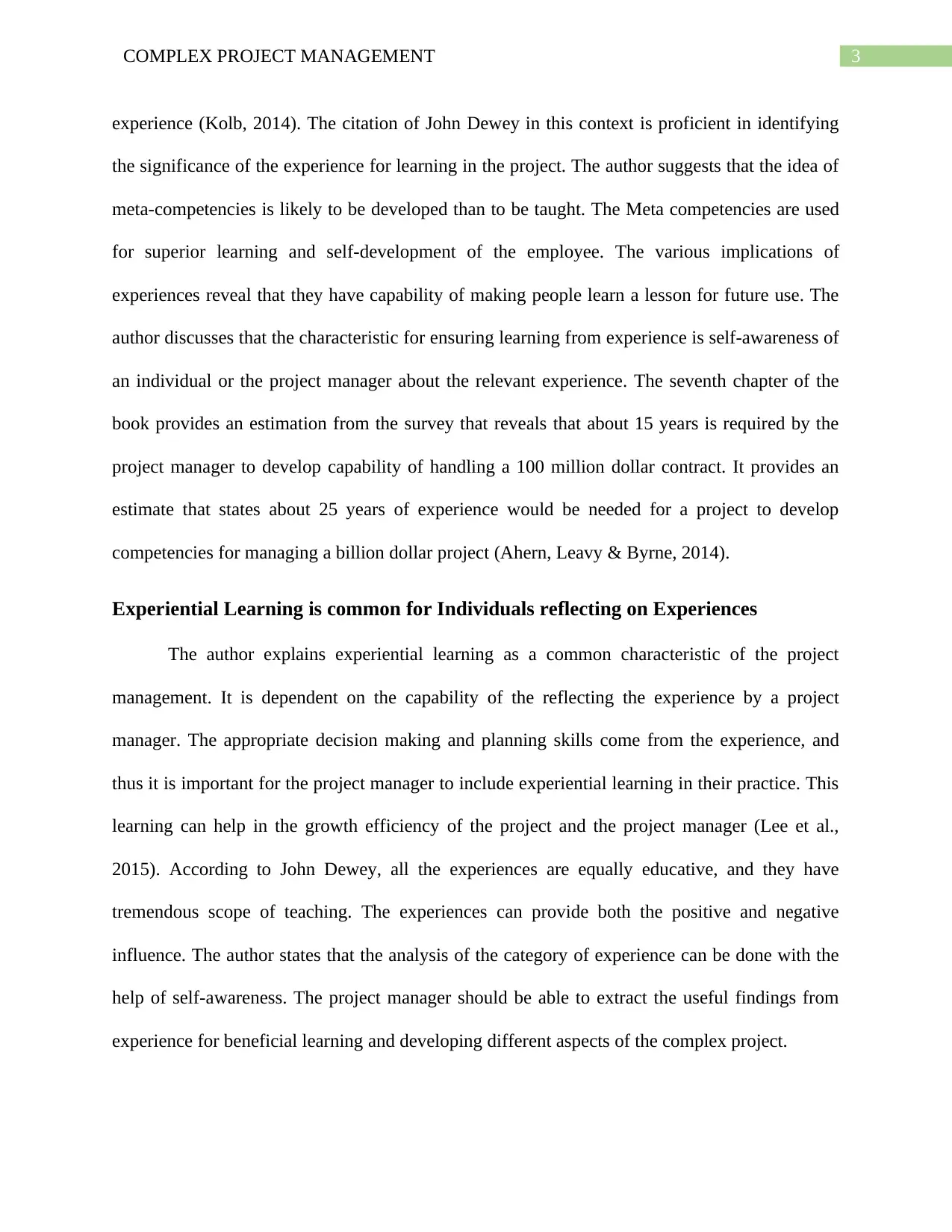
3COMPLEX PROJECT MANAGEMENT
experience (Kolb, 2014). The citation of John Dewey in this context is proficient in identifying
the significance of the experience for learning in the project. The author suggests that the idea of
meta-competencies is likely to be developed than to be taught. The Meta competencies are used
for superior learning and self-development of the employee. The various implications of
experiences reveal that they have capability of making people learn a lesson for future use. The
author discusses that the characteristic for ensuring learning from experience is self-awareness of
an individual or the project manager about the relevant experience. The seventh chapter of the
book provides an estimation from the survey that reveals that about 15 years is required by the
project manager to develop capability of handling a 100 million dollar contract. It provides an
estimate that states about 25 years of experience would be needed for a project to develop
competencies for managing a billion dollar project (Ahern, Leavy & Byrne, 2014).
Experiential Learning is common for Individuals reflecting on Experiences
The author explains experiential learning as a common characteristic of the project
management. It is dependent on the capability of the reflecting the experience by a project
manager. The appropriate decision making and planning skills come from the experience, and
thus it is important for the project manager to include experiential learning in their practice. This
learning can help in the growth efficiency of the project and the project manager (Lee et al.,
2015). According to John Dewey, all the experiences are equally educative, and they have
tremendous scope of teaching. The experiences can provide both the positive and negative
influence. The author states that the analysis of the category of experience can be done with the
help of self-awareness. The project manager should be able to extract the useful findings from
experience for beneficial learning and developing different aspects of the complex project.
experience (Kolb, 2014). The citation of John Dewey in this context is proficient in identifying
the significance of the experience for learning in the project. The author suggests that the idea of
meta-competencies is likely to be developed than to be taught. The Meta competencies are used
for superior learning and self-development of the employee. The various implications of
experiences reveal that they have capability of making people learn a lesson for future use. The
author discusses that the characteristic for ensuring learning from experience is self-awareness of
an individual or the project manager about the relevant experience. The seventh chapter of the
book provides an estimation from the survey that reveals that about 15 years is required by the
project manager to develop capability of handling a 100 million dollar contract. It provides an
estimate that states about 25 years of experience would be needed for a project to develop
competencies for managing a billion dollar project (Ahern, Leavy & Byrne, 2014).
Experiential Learning is common for Individuals reflecting on Experiences
The author explains experiential learning as a common characteristic of the project
management. It is dependent on the capability of the reflecting the experience by a project
manager. The appropriate decision making and planning skills come from the experience, and
thus it is important for the project manager to include experiential learning in their practice. This
learning can help in the growth efficiency of the project and the project manager (Lee et al.,
2015). According to John Dewey, all the experiences are equally educative, and they have
tremendous scope of teaching. The experiences can provide both the positive and negative
influence. The author states that the analysis of the category of experience can be done with the
help of self-awareness. The project manager should be able to extract the useful findings from
experience for beneficial learning and developing different aspects of the complex project.
Paraphrase This Document
Need a fresh take? Get an instant paraphrase of this document with our AI Paraphraser
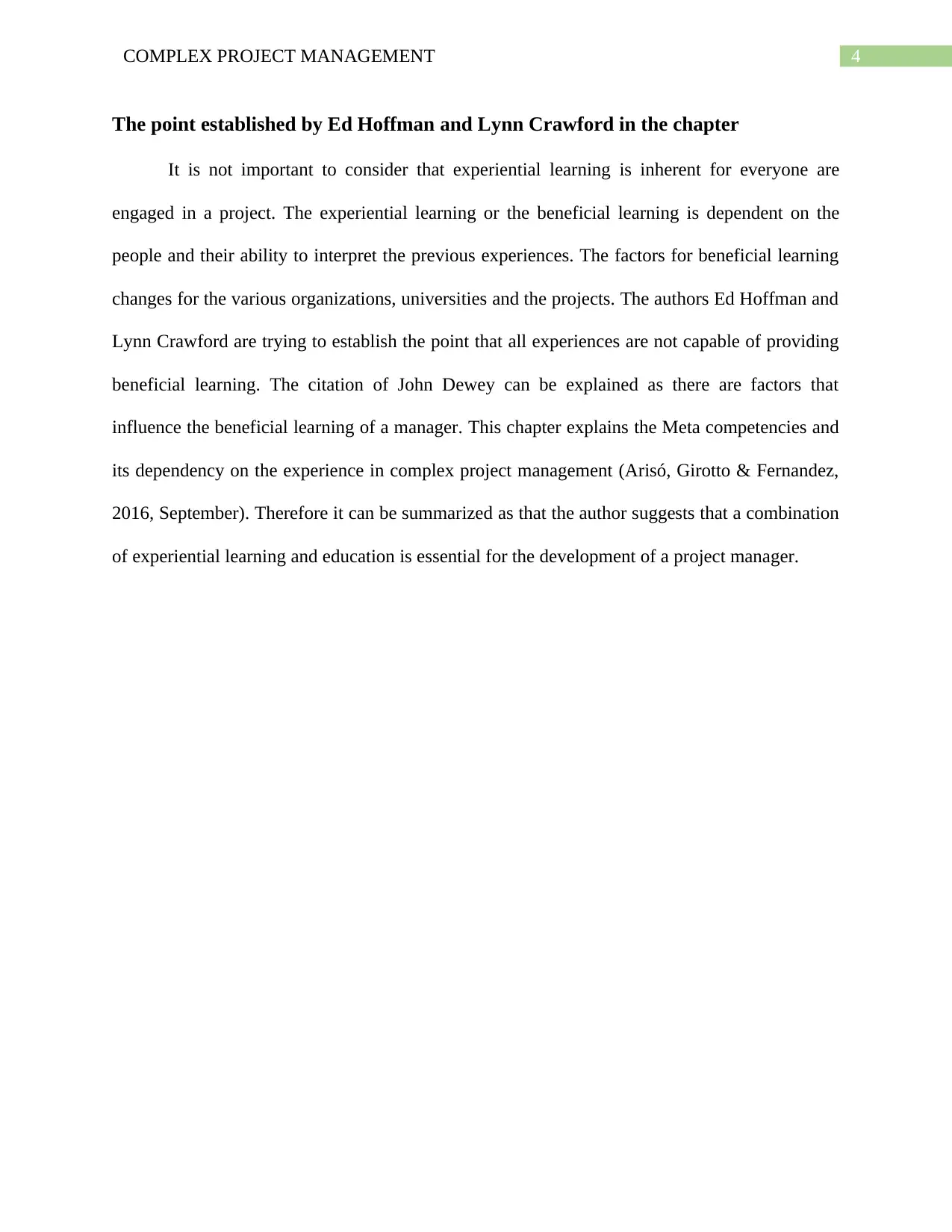
4COMPLEX PROJECT MANAGEMENT
The point established by Ed Hoffman and Lynn Crawford in the chapter
It is not important to consider that experiential learning is inherent for everyone are
engaged in a project. The experiential learning or the beneficial learning is dependent on the
people and their ability to interpret the previous experiences. The factors for beneficial learning
changes for the various organizations, universities and the projects. The authors Ed Hoffman and
Lynn Crawford are trying to establish the point that all experiences are not capable of providing
beneficial learning. The citation of John Dewey can be explained as there are factors that
influence the beneficial learning of a manager. This chapter explains the Meta competencies and
its dependency on the experience in complex project management (Arisó, Girotto & Fernandez,
2016, September). Therefore it can be summarized as that the author suggests that a combination
of experiential learning and education is essential for the development of a project manager.
The point established by Ed Hoffman and Lynn Crawford in the chapter
It is not important to consider that experiential learning is inherent for everyone are
engaged in a project. The experiential learning or the beneficial learning is dependent on the
people and their ability to interpret the previous experiences. The factors for beneficial learning
changes for the various organizations, universities and the projects. The authors Ed Hoffman and
Lynn Crawford are trying to establish the point that all experiences are not capable of providing
beneficial learning. The citation of John Dewey can be explained as there are factors that
influence the beneficial learning of a manager. This chapter explains the Meta competencies and
its dependency on the experience in complex project management (Arisó, Girotto & Fernandez,
2016, September). Therefore it can be summarized as that the author suggests that a combination
of experiential learning and education is essential for the development of a project manager.
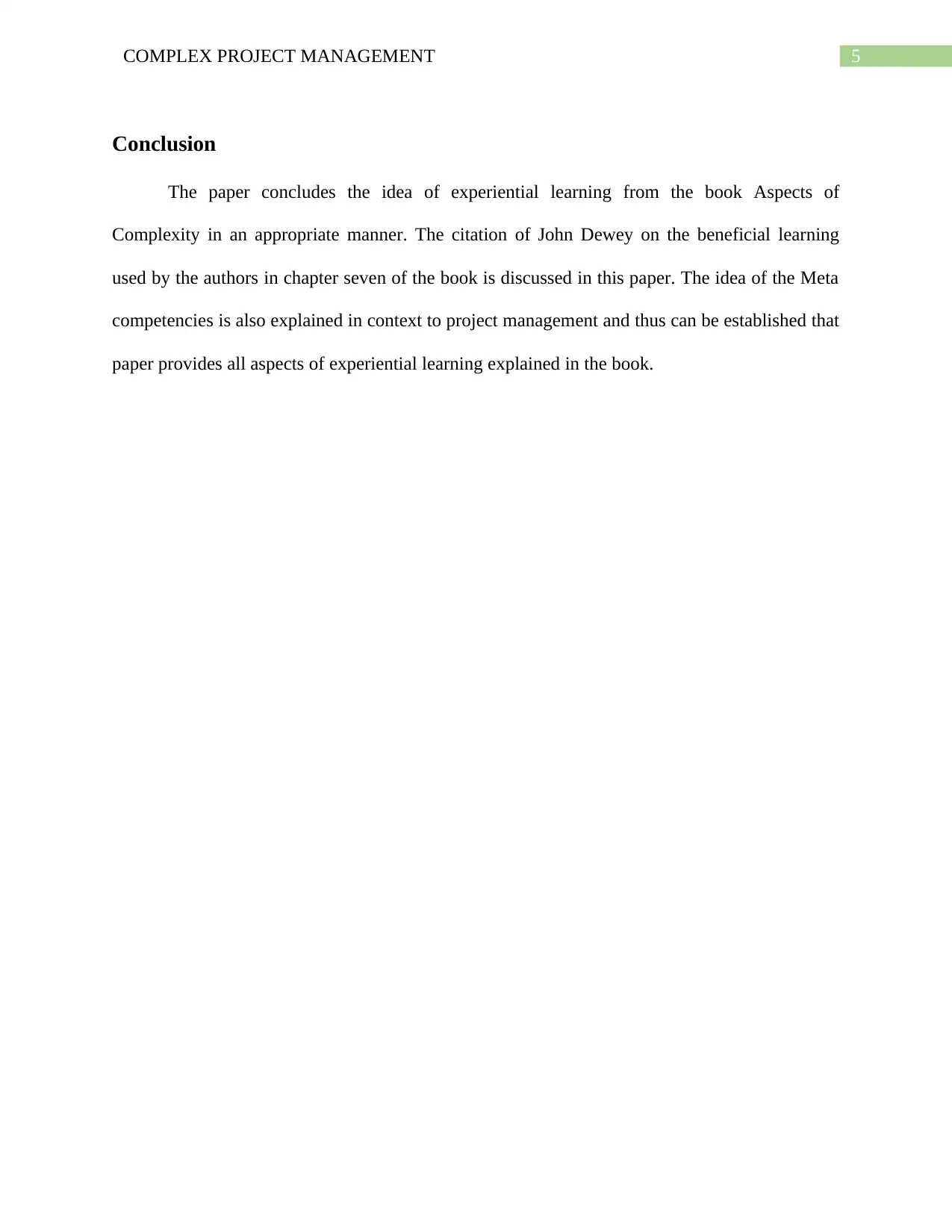
5COMPLEX PROJECT MANAGEMENT
Conclusion
The paper concludes the idea of experiential learning from the book Aspects of
Complexity in an appropriate manner. The citation of John Dewey on the beneficial learning
used by the authors in chapter seven of the book is discussed in this paper. The idea of the Meta
competencies is also explained in context to project management and thus can be established that
paper provides all aspects of experiential learning explained in the book.
Conclusion
The paper concludes the idea of experiential learning from the book Aspects of
Complexity in an appropriate manner. The citation of John Dewey on the beneficial learning
used by the authors in chapter seven of the book is discussed in this paper. The idea of the Meta
competencies is also explained in context to project management and thus can be established that
paper provides all aspects of experiential learning explained in the book.
⊘ This is a preview!⊘
Do you want full access?
Subscribe today to unlock all pages.

Trusted by 1+ million students worldwide
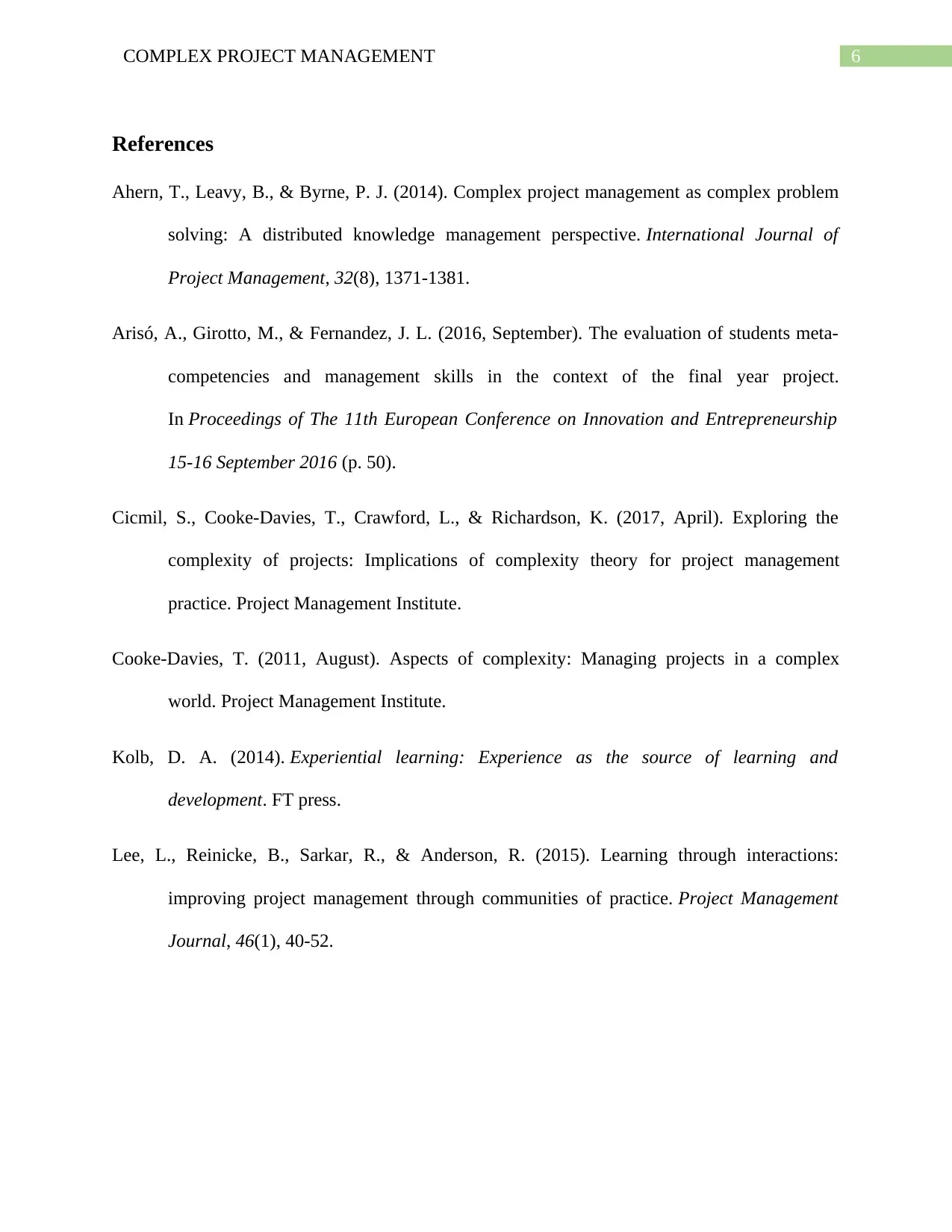
6COMPLEX PROJECT MANAGEMENT
References
Ahern, T., Leavy, B., & Byrne, P. J. (2014). Complex project management as complex problem
solving: A distributed knowledge management perspective. International Journal of
Project Management, 32(8), 1371-1381.
Arisó, A., Girotto, M., & Fernandez, J. L. (2016, September). The evaluation of students meta-
competencies and management skills in the context of the final year project.
In Proceedings of The 11th European Conference on Innovation and Entrepreneurship
15-16 September 2016 (p. 50).
Cicmil, S., Cooke-Davies, T., Crawford, L., & Richardson, K. (2017, April). Exploring the
complexity of projects: Implications of complexity theory for project management
practice. Project Management Institute.
Cooke-Davies, T. (2011, August). Aspects of complexity: Managing projects in a complex
world. Project Management Institute.
Kolb, D. A. (2014). Experiential learning: Experience as the source of learning and
development. FT press.
Lee, L., Reinicke, B., Sarkar, R., & Anderson, R. (2015). Learning through interactions:
improving project management through communities of practice. Project Management
Journal, 46(1), 40-52.
References
Ahern, T., Leavy, B., & Byrne, P. J. (2014). Complex project management as complex problem
solving: A distributed knowledge management perspective. International Journal of
Project Management, 32(8), 1371-1381.
Arisó, A., Girotto, M., & Fernandez, J. L. (2016, September). The evaluation of students meta-
competencies and management skills in the context of the final year project.
In Proceedings of The 11th European Conference on Innovation and Entrepreneurship
15-16 September 2016 (p. 50).
Cicmil, S., Cooke-Davies, T., Crawford, L., & Richardson, K. (2017, April). Exploring the
complexity of projects: Implications of complexity theory for project management
practice. Project Management Institute.
Cooke-Davies, T. (2011, August). Aspects of complexity: Managing projects in a complex
world. Project Management Institute.
Kolb, D. A. (2014). Experiential learning: Experience as the source of learning and
development. FT press.
Lee, L., Reinicke, B., Sarkar, R., & Anderson, R. (2015). Learning through interactions:
improving project management through communities of practice. Project Management
Journal, 46(1), 40-52.
1 out of 7
Related Documents
Your All-in-One AI-Powered Toolkit for Academic Success.
+13062052269
info@desklib.com
Available 24*7 on WhatsApp / Email
![[object Object]](/_next/static/media/star-bottom.7253800d.svg)
Unlock your academic potential
Copyright © 2020–2026 A2Z Services. All Rights Reserved. Developed and managed by ZUCOL.


